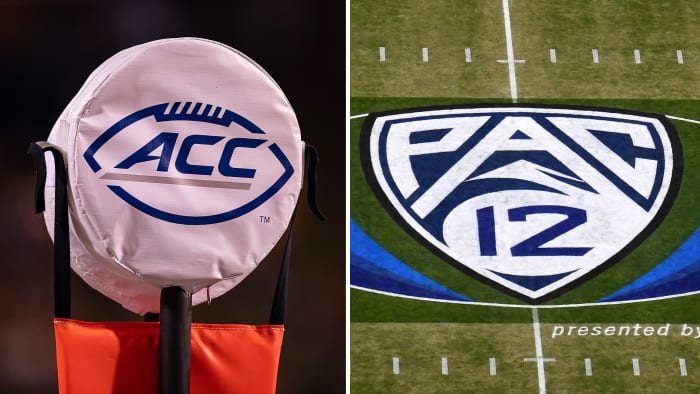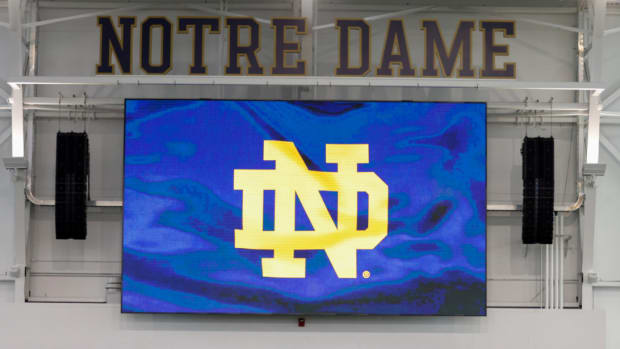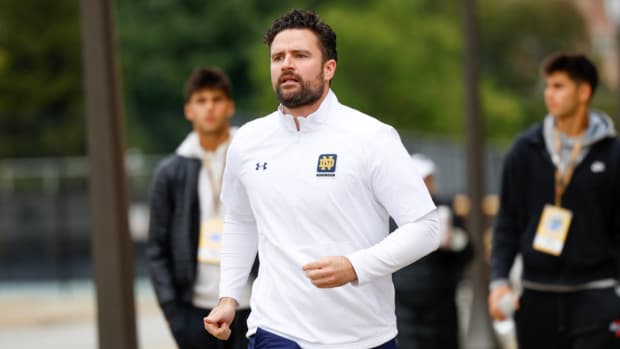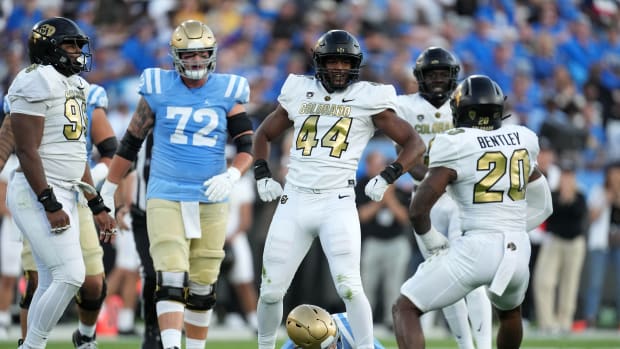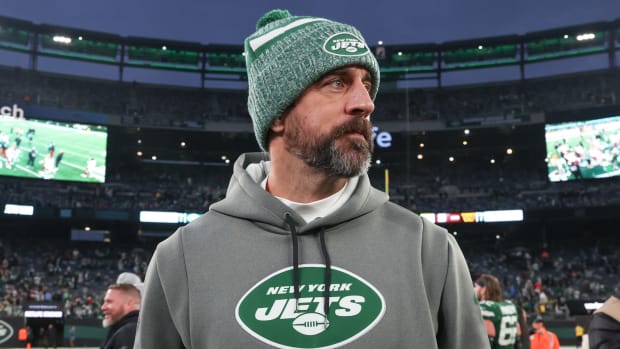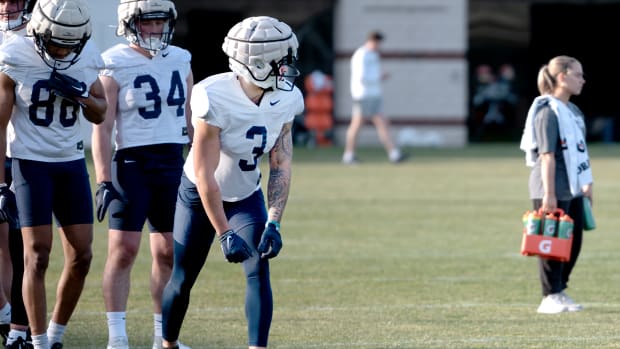Sources: ACC, Pac-12 Discussing ESPN TV Partnership After Big Ten’s Moves
Officials from the ACC and Pac-12 are discussing a broadcasting partnership with ESPN that would bring together the two Power 5 leagues from opposite coasts for a mutually beneficial relationship, sources tell Sports Illustrated.
The proposal, still in its infancy, heavily involves the ESPN-owned ACC Network. Under the plan, the ACC Network—or a renamed entity combining the two leagues—will have exclusive rights to broadcast Pac-12 games to West Coast households through ESPN cable providers. The agreement is not a merger or consolidation of the leagues but is instead built around a media rights agreement with the worldwide leader in sports—an effort to clap back at the Pac-12’s loss of USC and UCLA to the Big Ten.
While the joint move could feature marquee nonconference matchups from the West and East Coasts—think Clemson-Washington or Miami-Oregon—the primary reason behind the partnership is the TV property. This would replace the failed Pac-12 Network with a reliable provider that can reach millions of homes out west.
The potential agreement could conceivably benefit all involved: The ACC is expected to receive long-sought additional television revenue; ESPN gets a piece of Pac-12 inventory; and the Pac-12 presumably stays intact, with its 10 remaining members getting an attractive TV arrangement. It might also be a more desirable alternative for Pac-12 schools than looking to join the Big 12. At least one Pac-12 source disputed reports of “serious” talks between some remaining schools and the Big 12.
However, those briefed on the ACC–Pac-12 proposal believe it has plenty of hurdles to clear and details to be ironed out before becoming a reality. This should be a more long term and deliberate decision that could take weeks, if not months, to rectify, says one administrator. The key question: Does the arrangement generate enough additional revenue to be worthwhile?
One administrator who has knowledge of the discussions said ACC athletic directors first heard of the idea during a conference call Friday. “It’s something that has been considered worth exploring, but nothing has had any detail put behind it,” the administrator said. “The general response has been, ‘Give us more [specificity].’”
In a way, the proposal is an extension of the Pac-12 and ACC’s so-called alliance with the Big Ten, a nonbinding agreement announced last year whose goal was believed to be to prevent any further expansion among the Power 5. It was a response to the SEC’s 2021 acquisition of Texas and Oklahoma, but it blew up spectacularly when the Big Ten raided the Pac-12.
In response to that, the ACC and Pac-12 find themselves scrambling to maintain relevance in a market that has seen their top two competitor leagues—already the richest in college sports—increase significantly in value. Relatively new to their jobs, ACC commissioner Jim Phillips and Pac-12 commish George Kliavkoff have a good working relationship, according to sources, and are exploring ways to work together.
For the Pac-12, the partnership may be the best possible solution to retain its remaining members, but is it worthwhile for the ACC? It’s unclear exactly how much additional revenue the league would generate from such a move. But any extra dollars are a plus, given the ACC’s long-term TV contract limbo. ACC members are estimated to receive far less in media rights revenue than their competitors’ new deals in the Big Ten and SEC. The ACC is locked into the deal through 2036.
The new partnership with the Pac-12 may not reopen the contract, but it will change the bottom line. That might be the best option for the ACC, because a complete renegotiation of the contract could open a path for the league’s most valuable properties—North Carolina, Clemson, Florida State, Miami and Virginia—to explore leaving. As it stands, escaping the ACC’s grant of rights deal could be both costly and complicated.
ESPN would gain a foothold on the West Coast, assuring it holds substantial rights for three of the five Power 5 leagues in the wake of Fox’s stranglehold on the Big Ten (the network is believed to have at least a 60% share of the Big Ten’s new TV deal). ESPN is expected to be prominently involved in the Pac-12’s negotiations for a new media rights deal, but the product was diminished by the loss of the Los Angeles market. This arrangement could be a way for ESPN to get more out of an agreement with the Pac-12.
Meanwhile, Kliavkoff is working to keep his 10 schools from being poached by a new colleague. Big 12 commissioner Brett Yormark, brand new to the job, has been aggressive in his pursuit of the remaining Pac-12 programs. The Big 12 is specifically targeting the remaining four from the Pac-12 South: Arizona, Arizona State, Utah and Colorado. The nature of that pursuit is unclear, as is the level of interest from those schools in making a move. With sources indicating Oregon and Washington do not have a clear and imminent path to the Big Ten, those schools might prefer staying in the Pac-12—which could, in turn, improve the chances of Arizona, Arizona State, Colorado and Utah staying in the league.
For Kliavkoff, the potential partnership with the ACC would project strength at a time when the Pac-12 is weak and guarantees something the Big 12 cannot—a regional network television partner. The Pac-12 would be grabbing a lifeline from the ACC at a time when the Big 12 is attacking its membership.
In an ironic twist, it comes nearly a year after the Pac-12 and ACC decided against plucking teams from the Big 12, which at the time was scrambling after the loss of its two biggest brands, Oklahoma and Texas, to the SEC. The Pac-12 and ACC also declined a partnership with the Big 12 a year ago, triggering the conference to add four new members in Houston, BYU, Cincinnati and UCF, and resulted in more Group of 5 conference dominoes to fall in a wave of conference realignment. The next wave is here, sparked by the stunning news last week that USC and UCLA are moving to the Big Ten.
In the meantime, the eyes of many within college athletics are trained on independent Notre Dame. Will the Irish finally be moved to join a league full-time? And will that conference be the Big Ten? A source familiar with the thinking at Notre Dame recently told SI, “Independence remains the preference and the leader in the clubhouse.” Washington and Oregon also remain attractive brands for the Big Ten, but their fate may be determined based on Notre Dame’s decision—and the Fighting Irish do not feel compelled to rush it.
“This is all about money,” says one Pac-12 official. “The SEC has got the most of it and the Big Ten has the second most of it and the ACC is stuck in a less-than-optimal deal. And the Pac-10 - we have to start calling it the Pac-10 now - is figuring out what our new TV deal looks like, and the Big 12, it appears, is after us.”
All of this potential movement will be determined by money. Any conference expansion means divvying up television dollars in more ways. Thus, each additional school must bring substantial value to a league to make it worthwhile financially.
Does the Big 12 really see value in adding four or six schools from the west? Does the ACC think it valuable enough to agree to a media partnership with the Pac-12? And does Notre Dame see the value in joining a league? These questions loom in one of the most uncertain and chaotic times in the recent history of college athletics.
The gears driving any decision is obvious, says one prominent athletic administrator: “It all boils down to the dollars.”
Watch ESPN with fuboTV: Start a 7-day trial today!
More College Coverage:
• USC, UCLA and Big Ten Get Theirs, but At What Cost?
• What USC, UCLA’s Move Means for College Sports
• Brady Quinn Presents Case for Notre Dame to Join Big Ten
